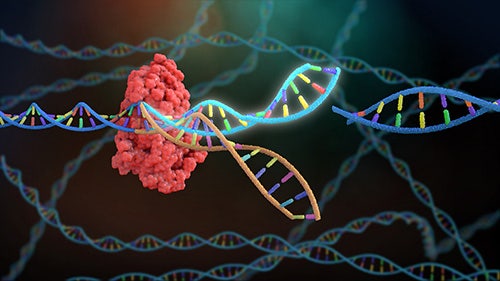Directed evolution of Cas9 broadens PAM sequence compatibility
While CRISPR-Cas9 has been revolutionary in enabling genome modifications at single-nucleotide resolution, some loci remain inaccessible to Cas9 enzymes—especially those with pyrimidine-rich protospacer-adjacent motif (PAM) sequences. To address these limitations, researchers have developed Cas protein variants exhibiting broadened or altered PAM compatibility. However, these can still only access a subset of pyrimidine-containing PAMs. Using directed evolution, researchers at the David Liu lab within the Broad Institute generated four novel Cas9 variants that collectively enable the targeting of most pyrimidine-rich PAM sequences in the human genome. Their data, published in Nature Biotechnology, show these to have comparable or higher activity in several human cell types compared with existing Cas9 variants.

Nme2Cas9 is an attractive Cas ortholog for evolving PAM compatibility
Liu et al. selected Nme2Cas9, a Cas9 variant from Neisseria meningitidis, for evolving PAM compatibility due to its known activity on pyrimidine-rich N4CC PAMs. In addition, the small size of Nme2Cas9 (1,082 amino acids compared to 1,368 amino acids in Streptococcus pyogenes Cas9) promises easier delivery. Nme2Cas9 has also demonstrated robust activity in mammalian cells as both a nuclease and a base editor.
Integration of three novel technologies enables directed evolution of Nme2Cas9
To generate and characterize novel Nme2Cas9 variants, Liu et al. developed a form of functional selection termed sequence-agnostic Cas phage-assisted continuous evolution (SAC-PACE). This enables the identification of Cas9-based genome editing agents with altered PAM compatibilities by linking PAM binding and subsequent base editing to the propagation of ΔgIII-phage. Liu et al. then showed that this method could be combined with an automated continuous culture platform (eVOLVER) to increase experimental throughput, an approach they termed ePACE. Next, a base editing-dependent PAM-profiling assay (BE-PPA) was developed for rapidly assessing the PAM specificities of newly evolved Cas9 variants in base editor form. This involved cloning plasmids containing base editors of interest into E. coli, followed by library plasmids, each containing a target protospacer and target base (adenine or cytosine) flanked by a library of PAMs. Base editor expression was induced, and plasmid DNA harvested for high-throughput sequencing.
Evolved Nme2Cas9 variants show enhanced activity in mammalian cells
Using the approaches described, Liu et al. evolved four Nme2Cas9 variants capable of robust precision genome editing at PAMs with a single specified pyrimidine nucleotide. Of these, eNme2-C achieved ≥80% A•T-to-G•C editing at all N4CC PAM sites, corresponding to a 4.8-fold improvement over an existing variant (Nme2-ABE8e). To determine whether this activity translated to mammalian cells, Liu et al. transfected multiple human cell lines with both the Cas effector plasmid and a guide RNA plasmid before harvesting the genomic DNA for sequencing. They also generated base editor mRNA from the effector plasmid using the HiScribe T7 High-Yield RNA Synthesis Kit (New England Biolabs, NEB) for in vitro transcription. NEB’s kit allowed researchers to leverage its flexibility by fully substituting uridine for TriLink’s N1-methyl-pseudouridine and streamlining mRNA capping with CleanCap® AG co-transcriptional capping reagent. Key findings included the observation that eNme2-C showed 2.0-fold higher average editing efficiency on N4CC PAM sites and 15-fold higher editing efficiency on N4CD PAM sites (where D is A, G or T) compared to Nme2-ABE8e.
Future perspectives
The high-throughput continuous evolution of compact Cas9 variants targeting single-nucleotide-pyrimidine PAMs promises to improve the functional activities of any Cas ortholog. It may also be applied to optimize editing at a specific PAM or target site, extending the reach of CRISPR-Cas9 gene editing.
Featured products: N1-methyl-pseudouridine and CleanCap® AG. Now also available at GMP grade.
Article reference: Huang TP, Heins ZJ, Miller SM, et al. High-throughput continuous evolution of compact Cas9 variants targeting single-nucleotide-pyrimidine PAMs. Nat Biotechnol. 2022; 10.1038/s41587-022-01410-2.


